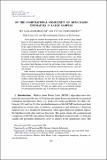| dc.contributor.author | Belloni, Alexandre | |
| dc.contributor.author | Chernozhukov, Victor V. | |
| dc.date.accessioned | 2013-09-26T15:17:18Z | |
| dc.date.available | 2013-09-26T15:17:18Z | |
| dc.date.issued | 2009-08 | |
| dc.date.submitted | 2008-06 | |
| dc.identifier.issn | 0090-5364 | |
| dc.identifier.uri | http://hdl.handle.net/1721.1/81193 | |
| dc.description.abstract | In this paper we examine the implications of the statistical large sample theory for the computational complexity of Bayesian and quasi-Bayesian estimation carried out using Metropolis random walks. Our analysis is motivated by the Laplace–Bernstein–Von Mises central limit theorem, which states that in large samples the posterior or quasi-posterior approaches a normal density. Using the conditions required for the central limit theorem to hold, we establish polynomial bounds on the computational complexity of general Metropolis random walks methods in large samples. Our analysis covers cases where the underlying log-likelihood or extremum criterion function is possibly nonconcave, discontinuous, and with increasing parameter dimension. However, the central limit theorem restricts the deviations from continuity and log-concavity of the log-likelihood or extremum criterion function in a very specific manner.
Under minimal assumptions required for the central limit theorem to hold under the increasing parameter dimension, we show that the Metropolis algorithm is theoretically efficient even for the canonical Gaussian walk which is studied in detail. Specifically, we show that the running time of the algorithm in large samples is bounded in probability by a polynomial in the parameter dimension d and, in particular, is of stochastic order d2 in the leading cases after the burn-in period. We then give applications to exponential families, curved exponential families and Z-estimation of increasing dimension. | en_US |
| dc.description.sponsorship | Alfred P. Sloan Foundation (Research Fellowship) | en_US |
| dc.description.sponsorship | National Science Foundation (U.S.) | en_US |
| dc.description.sponsorship | IBM Research (IBM Herman Goldstein Fellowship) | en_US |
| dc.description.sponsorship | Massachusetts Institute of Technology. Dept. of Economics (Castle Krob Chair) | en_US |
| dc.language.iso | en_US | |
| dc.publisher | Institute of Mathematical Statistics | en_US |
| dc.relation.isversionof | http://dx.doi.org/10.1214/08-aos634 | en_US |
| dc.rights | Article is made available in accordance with the publisher's policy and may be subject to US copyright law. Please refer to the publisher's site for terms of use. | en_US |
| dc.source | Institute of Mathematical Statistics | en_US |
| dc.title | On the computational complexity of MCMC-based estimators in large samples | en_US |
| dc.type | Article | en_US |
| dc.identifier.citation | Belloni, Alexandre, and Victor Chernozhukov. “On the computational complexity of MCMC-based estimators in large samples.” The Annals of Statistics 37, no. 4 (August 2009): 2011-2055. © 2009 Institute of Mathematical Statistics. | en_US |
| dc.contributor.department | Massachusetts Institute of Technology. Department of Economics | en_US |
| dc.contributor.mitauthor | Chernozhukov, Victor V. | en_US |
| dc.relation.journal | Annals of Statistics | en_US |
| dc.eprint.version | Final published version | en_US |
| dc.type.uri | http://purl.org/eprint/type/JournalArticle | en_US |
| eprint.status | http://purl.org/eprint/status/PeerReviewed | en_US |
| dspace.orderedauthors | Belloni, Alexandre; Chernozhukov, Victor | en_US |
| dc.identifier.orcid | https://orcid.org/0000-0002-3250-6714 | |
| mit.license | PUBLISHER_POLICY | en_US |
| mit.metadata.status | Complete | |
